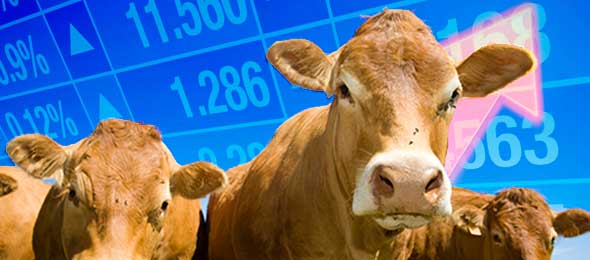Cattle Jump to Contract Highs as Winter Storm Hits U.S. Plains

U.S. cattle futures climbed to life-of-contract highs on Thursday as a storm brought blizzard-like conditions to much of the Plains cattle belt,
stoking expectations of higher prices for the animals in cash markets, traders said
Reuters
Heavy snow could impede transportation of cattle to market in Nebraska, Kansas, Oklahoma and elsewhere while declining temperatures were likely to stress animals and slow the rate of weight gain.
The National Weather Service warned that travel was hazardous, with as much as 10 inches (25 cm) of snow falling in some states.
“For hogs, I wouldn’t want to bet on that pushing further down, particularly if we get Chinese demand because of any African swine fever issues”
“The storm coming here is giving a boost to the cash expectations,” one U.S. livestock futures trader said of cattle.
One broker predicted beef packers would have to pay higher prices for cattle this week.
In the Chicago Mercantile Exchange futures market, February live cattle ended up 1.200 cents at 123.950 cents per pound, below the lifetime peak of 124.900 cents notched earlier in the session. On a continuous chart reflecting the thinly traded December contact, cattle prices jumped to the
highest since April 30.CME January feeder cattle futures finished up 0.900 cent to 149.00 cents per pound, highest since Nov. 27.
Lean hog futures were mixed, with the most-active February contract settling 0.200 cent higher at 60.575 cents while most other hog contracts were narrowly lower.
Bargain buying helped to limit losses in hogs, after prices on Wednesday dipped to six-week lows.
Livestock traders have struggled to balance abundant U.S. hog supplies with expectations that exports of American pork to China could spike next year.
China may boost pork imports as the African swine fever virus spreads, forcing hog producers to cull herds in the top global hog producing and pork consuming country.
“For hogs, I wouldn’t want to bet on that pushing further down, particularly if we get Chinese demand because of any African swine fever issues,” said Summit Commodities analyst Tomm Pfitzenmaier.
China loosened the rules on the transportation of breeder pigs and piglets in provinces that are affected by the African swine fever, the Ministry of Agriculture and Rural Affairs said on its website.
The move, which came after Beijing reported more than 90 cases of the highly contagious disease since August, was put in place to ensure pig production and pork supplies.
Meanwhile, a U.S. Department of Agriculture attache said Hong Kong officials were on alert that the disease could spread over the border from China.











